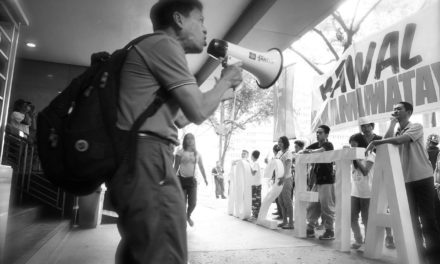On agriculture, Tim Groser the chair said that he wants more time to reflect on his own and he will produce a written progress report by tomorrow. He agreed that talks were stagnating. The NAMA chair Johanssen was more optimistic but still indicated significant lack of progress and will also produce a report on the last day of the GC. The Chair of the GC Amb. Amina Muhammed of Kenya also mentioned that the formal GC will end as scheduled on 29 evening and will not be extended to the weekend. There were rumours that there might be an extension given the presence of ministers.
Civil society groups were able to meet with delegations of key developing countries yesterday to get a sense of positions and also speak about their concerns on the current talks.
BRAZIL: SAYS THE BALL IS IN THE EU AND US’ COURT
Brazil’s incoming Ambassador Clodoaldo Hugenuey told groups who met him that even though NAMA is closely linked to agriculture, it is not willing to make trade-offs between the two. In agriculture he said that Brazil is not only putting emphasis on the market access issue but also on the question of trade distorting domestic support, especially in the EU and US. There must be clear criteria for green box (which allows for non-trade distorting subsidies) and if there was no discipline for the blue box (which allows minimum trade distorting subsidies) it would oppose the US demand for a new blue box in the Doha round. He added that this is a crucial phase before Hong Kong where political decisions have to be made and there are few signs from the US and EU that they are willing to move forward. He added that in the coming months it was crucial to maintain the strength of the G20 in close collaboration with the G33. Brazil’s foreign minister Celso Amorim is confirmed to attend the G33 Ministerial Meeting in Pakistan, 9-10 September 2005.
INDONESIA: WHITHER SP AND SSM?
Indonesia is the chair of the G33 – a group that has pushed for protection for its farmers through the mechanism of identifying Special Products (SP) and putting in place Special Safeguard Mechanisms (SSM). Indonesian agriculture negotiators reiterated that the key issue for them was tariff cuts and they are opposed to the Swiss formula approach pushed by the big agriculture exporters. Negotiators said were under pressure from the EU and the US to put down clear criteria for SP and SSM. The G33 wants broad and flexible criteria that would allow them to put more than 100 products on the table. The EU and US wants this narrowed to 3-5 products, however Indonesian negotiators said this is unacceptable to the group.
PHILIPPINES: LOOKING FOR THE MIDDLE GROUND?
On agriculture, Philippines Ambassador Teehankee reported that the critical issue remains the formula for tariff reduction. Teehankee reaffirmed that there is growing recognition that the two extreme demands, the US demand for a Swiss formula and the EU demand for a Uruguay Round formula, cannot be accepted anymore and at this point there is convergence on using the G20 multi-tiered proposal.
On GATS, it was reported that only 20 developing countries still have not submitted their offers while all developed countries have done so. The mission stated that, along with several developing countries, the Philippines opposes the EU proposal for benchmarking in the GATS.
PROCESS: GETTING MURKIER
The USTR (United States Trade Representative) Rob Portman is expected to be in Geneva in the weekend but reports say that he is apparently holidaying in Geneva. Peter Mandelson the EU Trade Commissioner will be in town and he will address the press in a few hours. The EU Commissioners visit is interpreted as an attempt to show that the EU is willing to move the process since they have been blamed for stalling the talks by being very defensive on agriculture. Two Japanese ministers are in town and so is the Indian Commerce Minister Kamal Nath. In the civil society meeting with the Brazilian delegation it was confirmed that Minister Amorim is not coming since Portman is going to be holidaying and therefore a FIPs (the Five Interested Parties in agriculture, US, EU, Australia, India and Brazil) Ministerial will not take place. Several delegations in Geneva are now reconciled to the fact that they will have an intense post-summer period ahead when key negotiations will be held in autumn (Sep-Oct) in the run-up to the Hong Kong conference. The October GC is the next official pit stop before Hong Kong but the big trading powers are known for cutting underhand deals and then pushing it on the membership.
PROTEST OUTSIDE THE WTO BUILDING: CLEAR MESSAGE
The most exciting event yesterday was a loud and diverse protest outside the WTO secretariat where farmers, labour groups, fishworkers, womens groups and NGOs from across the world demanded that the talks be halted. Several bureaucrats were seen looking out of their rooms in the WTO, probably because nothing much was happening inside.
Today (Thursday) evening there will be a meeting of the HOD (Heads of Delegation) and some ministers from member countries. This is to work out the modalities for the GC meeting beginning at 10am tomorrow (Friday) morning. Tim Groser of New Zealand who is chairing the special session on Agriculture will end his stint in July. One of the candidates to replace him is Ambassador Jara of Chile, the chair of the special services session.
For more information on the shenanigans in Geneva write to:
Jacques Chai Chomtongdi – [email protected]
Joseph Purugganan – [email protected] / mailto:[email protected]



![[IN PHOTOS] In Defense of Human Rights and Dignity Movement (iDEFEND) Mobilization on the fourth State of the Nation Address (SONA) of Ferdinand Marcos, Jr.](https://focusweb.org/wp-content/uploads/2025/07/1-150x150.jpg)



